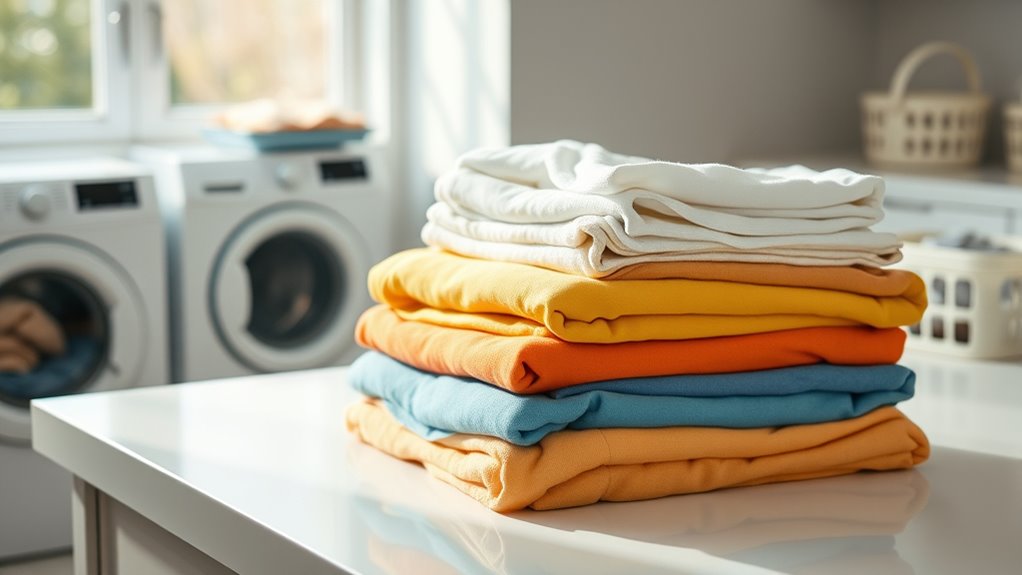Many laundry myths, like using hot water for stains or overusing bleach, can damage your clothes and shorten their lifespan. Instead, use cold water for protein-based stains and opt for natural whiteners like baking soda or vinegar. Avoid high spin speeds on delicate fabrics and air dry when possible to save energy and protect fibers. If you keep these tips in mind, you’ll improve your laundry results and keep clothes looking their best longer—there’s more essential advice ahead.
Key Takeaways
- Hot water isn’t always better; use cold or warm water for delicate fabrics and protein stains to prevent damage.
- Air drying clothes saves energy, reduces shrinkage, and helps you inspect for stains or damage before full drying.
- Bleach isn’t a universal brightener; natural alternatives like baking soda or vinegar are safer and gentler on fabrics.
- High spin speeds can harm delicate fabrics and cause wrinkles; adjust settings based on fabric type for better care.
- Fabric softeners can build up and irritate skin; vinegar in the rinse cycle naturally softens clothes and eliminates odors.

Many of the laundry tips you hear might not be as dependable as you think. It’s easy to fall for common advice that’s been passed down over the years, but some of these so-called “tips” are actually fabric care myths that could be doing more harm than good. For example, you might have heard that hot water is always best for removing stains, but that’s not true for every fabric or stain type. In fact, using hot water on delicate fabrics can cause shrinking or fading, and certain stains, like protein-based ones (think blood or sweat), actually respond better to cold water. Knowing the real stain removal secrets helps you avoid damaging your clothes and ensures you’re tackling stains effectively.
Many laundry tips are myths that can harm your clothes.
Another fabric care myth is that you should always toss your clothes into the dryer immediately after washing. Many believe that air drying is slower or less effective, but in reality, hanging clothes to dry can save energy, prevent shrinking, and reduce wear and tear. Plus, air drying can help you spot lingering stains or damage before it gets worse. If you’re worried about wrinkles, a quick tumble in the dryer with a damp towel can smooth things out without risking the damage caused by high heat.
You’ve probably also heard that bleach is a miracle worker for whitening clothes, but overusing it can weaken fabric fibers and cause yellowing over time. Instead, look for oxygen-based whiteners or natural alternatives like baking soda or vinegar, which can brighten whites safely. These options are gentler on your clothes and better for the environment.
Many people believe that fabric softeners are essential for soft, fresh-smelling laundry, but these products often contain chemicals that can build up in fabrics, reducing their absorbency and causing skin irritation. In contrast, adding a cup of vinegar to your rinse cycle can soften clothes naturally, eliminate odors, and break down detergent residues.
It’s also a myth that you need to run your washing machine at the highest spin cycle to get clothes dry faster. Higher spin speeds can actually damage delicate fabrics and cause excessive wrinkling. Adjusting the spin cycle to suit the fabric type is a smarter move that prolongs the life of your clothes.
Additionally, understanding the proper water temperature for different fabrics and stains can help maintain clothing quality and optimize cleaning results.
Frequently Asked Questions
Can I Reuse Laundry Detergent for Multiple Loads?
You might wonder if you can reuse detergent for multiple loads. It’s best to avoid that because detergent dilution can lead to ineffective cleaning and residue buildup. Instead, use fresh detergent for each wash and store any leftover in a sealed container away from moisture. Proper laundry storage guarantees your detergent stays effective, so you get clean clothes every time without waste or mess.
Is Fabric Softener Necessary for Clean Clothes?
You might wonder if fabric softener is necessary for clean clothes. The truth is, it’s not essential and often based on fabric softener myths. If you prefer softer clothes, try natural softening techniques like adding vinegar or baking soda during washes. These methods effectively soften fabrics without the chemicals in traditional softeners. So, whether you use fabric softener or not, focus on proper washing techniques to keep your clothes fresh and comfortable.
Should I Always Wash New Clothes Before Wearing?
Think of new clothes as a garden needing careful tending; you wouldn’t plant seeds without clearing the soil first. Washing new clothes before wearing them is essential for clothing hygiene and odor elimination, removing chemical residues and factory dirt that clings like shadows. Skipping this step risks exposing your skin to irritants and germs. Always wash new garments first to guarantee they’re fresh, safe, and truly ready to wear.
Do Certain Detergents Work Better for Specific Fabrics?
You’re wondering if certain detergent types work better for specific fabrics. The truth is, yes—some detergents are designed to enhance fabric compatibility, helping delicate items like silk or wool retain their softness and color. Always check labels to match detergents with fabric types, and opt for gentle, specialized formulas when washing sensitive or specialty fabrics. Using the right detergent types guarantees your clothes stay fresh, vibrant, and well-maintained.
How Often Should I Deep Clean My Washing Machine?
You should deep clean your washing machine at least once a month to maintain ideal washer maintenance. Regular cleaning prevents detergent residue buildup, which can hinder detergent efficiency and cause odors. Run a hot cycle with a washing machine cleaner or vinegar to remove grime and mold. This simple routine keeps your machine running smoothly, ensures your clothes come out fresh, and extends its lifespan.
Conclusion
Don’t let common laundry myths hold you back. For example, over 60% of people believe washing whites separately is essential, but modern detergents make this unnecessary. By debunking these lies, you save time, money, and energy. Remember, simple changes can make laundry less of a chore. When you stop believing these myths, laundry becomes easier and more efficient. Take control, and enjoy the process instead of dread it!









